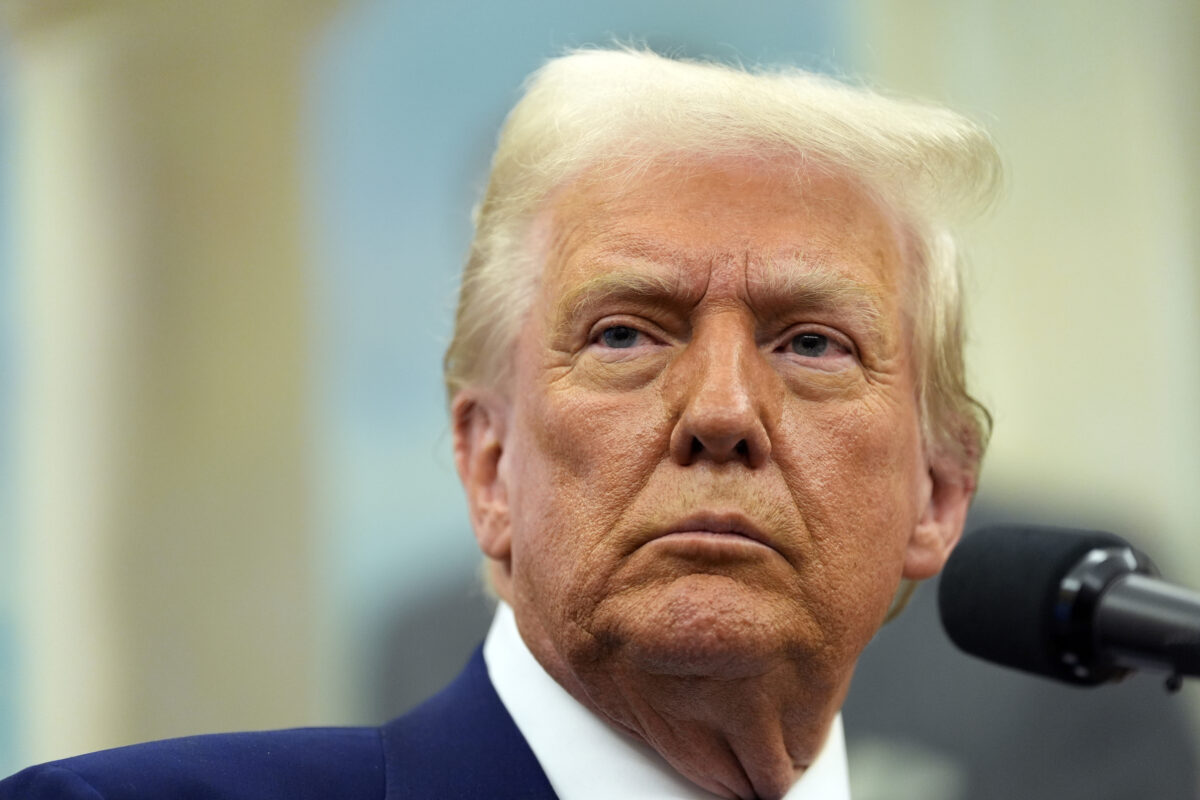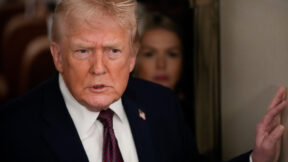Americans Should Take Trump’s Petty War on the AP Personally

Photo/Alex Brandon
President Donald Trump’s little war with the Associated Press – over its usage guidelines regarding the Gulf of Mexico – should anger every American except those who don’t care about democracy or transparent government.
The Gulf of Mexico has been called that for over 400 years, long before the United States existed. Its name is not a matter of debate or justice — it is a product of history, convention, and international usage and is recognized across the world. Yet in his latest manufactured controversy, Trump wants to rename it the “Gulf of America.”
The intention is clear – a nationalist dog whistle aimed at asserting unilateral dominance over a shared geographic feature, symbolically erasing Mexico, and projecting jingoistic populism, since Trump correctly assumes “America” will be widely understood to mean “United States.” It’s mainly a ploy to distract from more damaging outrages, like pullouts from the World Health Organization and Paris climate accord, which pose far greater threats to humanity.
This kind of Trumpian nonsense is also, as we should know by now, calculated to outrage reasonable people, because that delights his MAGA base. It is in this mode that Trump persists in capitalizing certain nouns, incorrectly and ridiculously, as when he tweeted this week that it was time to “end the War” in Ukraine.
This raises a tough question: When Trump aims to offend and generate headlines, should we give him that, or ignore it? It seems he’s not so stupid, because whichever way reasonable people go, it is a version of a win for him. It is also a dumbing down of society, which does not appear to faze the president. The answer to this question is that this time, we should take the bait, because freedom of the actually press is at stake. I’ll explain.
According to an AP statement, the organization was “informed by the White House that if AP did not align its editorial standards with President Donald Trump’s executive order renaming the Gulf of Mexico as the Gulf of America, AP would be barred from accessing an event in the Oval Office… Limiting our access to the Oval Office based on the content of AP’s speech not only severely impedes the public’s access to independent news, it plainly violates the First Amendment.”
It’s actually worse than that. It is the first salvo in a coming broader attack on the fundamental principles of transparency and accountability in government. It would be that with any reporter but is far more impactful with AP.
That’s because most American outlets don’t have their own reporters in Washington, instead relying on the AP (one of two large news agencies in the world, the other being Reuters) to provide them with coverage of national and international events. By barring AP from the Oval Office, Trump is not just targeting a single organization—he is actively restricting the flow of information to millions of Americans who rely on their local newspapers for news.
Names of places are determined by convention and usage, not by executive fiat. Governments have control over references in official communications, but don’t get to dictate how independent institutions use language. The AP (where I worked for decades as a reporter and senior editor) follows a well-established style guide that ensures clarity and consistency for a global audience. It has to, since its base of media clients is global. It does not — and should not — bow to a president’s whims about changing place names. No reputable news organization would.
The rest of the world will not adopt Trump’s arbitrary renaming. Mexico won’t recognize it. International bodies won’t recognize it. Even within the United States, few serious institutions outside Trump’s political bubble will actually accept it. If Trump’s goal was to change global consensus, he has failed. But, of course, that was never really the goal. The “Gulf of America” brouhaha is a device to deliver the message that media must comply. First with a silly edict, then with another, then with everything. The arc of authoritarians bends toward escalation.
In the coming four years, we can expect a broad effort to weaponize the government against critical news outlets, with Trump pressuring the Department of Justice and the Federal Communications Commission to investigate, fine, or harass organizations he views as enemies. He has previously floated prosecuting journalists, revoking licenses, and punishing networks that report unfavorably on him. He has long sought to weaken libel protections, making it easier for politicians to sue journalists, and with a more compliant judiciary, he might push this further.
Direct retaliation against media organizations—whether through selective regulatory enforcement, weaponized tax investigations, or attacks on ownership, or restrictions on access —could become a new norm. All this follows the authoritarian playbook seen in Hungary under Viktor Orban or even Russia under Vladimir Putin, where a compliant media ecosystem serves as a megaphone for those in power while dissenting voices are threatened, sued, or suppressed.
The AP is uniquely positioned to resist such pressure. Unlike most media organizations that operate as private businesses, the AP is a cooperative owned by its member newspapers, radio stations, and broadcasters – which are in turn a large section of the U.S. “clients” that use its text, visual, audio and TV content. It has no shareholders, no billionaire owner to appease, and no incentive to tailor coverage to a political agenda. Its reporters are trained to be as objective as possible, serving a wide array of global news outlets across ideological lines. In other words, Trump is picking a fight with one of the only media organizations whose very business model depends on fairness.
Trump’s most fervent supporters may cheer this seemingly petty move, but ordinary Americans should ask themselves: Do they really want a government that selectively punishes media outlets for independence? The AP is politically neutral, but some media are not. Would they support a future Democratic president targeting Fox News or The Wall Street Journal? What Trump is normalizing now could be used against conservative media in the future, and it would then be much harder to argue that it’s an affront to free speech.
A minority of Americans want to stamp out media; there’s not much to be done about that. But the funny part is that very few are clamoring for a name change for the Gulf of Mexico. No voter went to the ballot box thinking, “I wish my president would pick a fight with the AP over place names.” It’s a manufactured controversy that is yet another insult to the intelligence of the American people.
I spent years in the former communist world and in dictatorships, and my message is this: You don’t want to live there. In a democracy, the media’s role is not to serve the government but scrutinize it. A president at war with the media is a president at war with accountability. Americans should not let him win. I advise everyone to start by never, ever referring to the “Gulf of America.” And to patronize and support the free media.
Dan Perry was the top AP editor in Europe and Africa, in the Middle East, and in the Caribbean. He was chairman of the Foreign Press Association in Jerusalem. He writes frequently on world affairs, technology, and media, is the author of two books on the Middle East. Follow him at danperry.substack.com.





Comments
↓ Scroll down for comments ↓